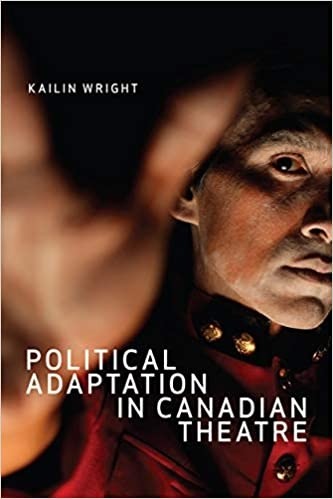
It was an exciting end to the year for StFX English professor Dr. Kailin Wright who saw her new monograph Political Adaptation in Canadian Theatre (McGill-Queens UP, 2020) listed on The Hill Times’ List of 100 Best Books in 2020, an annual feature The Hill Times compiles on the best non-fiction books of the year.
“It is very exciting to see Political Adaptation in Canadian Theatre recognized in this list and among other important works on Canadian politics, art, and culture,” says Dr. Wright, a Jules Léger Research Scholar at StFX, on her latest work, which examines plays that retell popular stories with a political message.
Dr. Wright says it is especially important to understand political adaptation right now because cultural appropriation is often political adaptation gone wrong.
“I started writing this book after looking through Canadian theatre archives that dated back to the early seventeenth century and realizing that so much of our theatre is adaptation, such as the adaptation of Shakespeare, Greek mythology, the Bible, and political figures’ lives,” she says.
“This history of performed adaptation continues today in theatres across Canada, but often with an announced political purpose, which is why my book sets out to define “political adaptation” or the retelling of a story with an announced political message. This includes, for instance, Margaret Atwood’s feminist adaptation The Penelopiad: the Play that retells Homer’s Odyssey from Penelope’s perspective. Atwood’s theatre adaptation inspired Penelope’s Circle, a group that supports young female artists. Djanet Sears’s Governor General Award winning play Harlem Duet is a prequel to Shakespeare’s Othello that imagines Othello leaving his first Black wife for the porcelain (Desde)Mona. With its emphasis on the significance of race in Othello, Sears’s political adaptation has been credited with changing the way Shakespeare’s play is now performed in Canada.
“In this way, political adaptations are transforming the way we think about identities and diversity. Playwrights use political adaptation as a way for (previously) marginalized perspectives to survive and even thrive within a tradition of inherited canonical narratives. Political adaptation changes who “we” are as a collective nation of nations. Ultimately, this book explores how art creates positive real-world change.”
With outcry over cultural appropriation, understanding how political adaptation works has never been more important, Dr. Wright says.
“Appropriation can occur when a political adaptation is not executed with respect for and with the involvement of the marginalized or diverse peoples it represents.”
Barry Freeman, associate professor at University of Toronto Scarborough, says on the book: “One comes away from Political Adaptation in Canadian Theatre with a renewed appreciation not just of the politics of adapting cultural texts, but of the plays discussed as truly impressive works of Canadian theatre. In a series of intellectually thorough and ethically careful analyses, Kailin Wright walks her reader through some of the ways that Canada is facing up to its past - and its future.”
McGill Queen’s University Press wrote: “In Canada, adaptation is a national mode of survival, but it is also a way to create radical change. Throughout history, Canadians have been inheritors and adaptors: of political systems, stories, and customs from the old world and the new. More than updating popular narratives, adaptation informs understandings of culture, race, gender, and sexuality, as well as individual experiences. In Political Adaptation in Canadian Theatre, Kailin Wright investigates adaptations that retell popular stories with a political purpose and examines how they acknowledge diverse realities and transform our past.

“An exciting intervention in adaptation studies, Political Adaptation in Canadian Theatre unsettles the dynamics of popular and political theatre and rethinks the ways performance can contribute to how one country defines itself.”
This research is, in part, made possible by the Government of Canada Research Support Fund.

